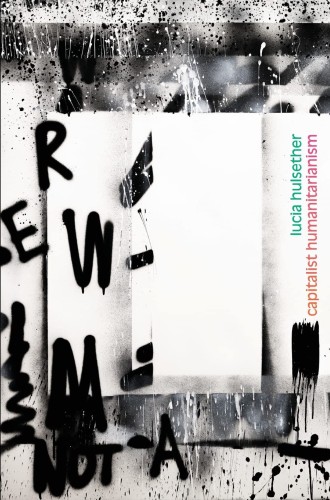Capitalism everywhere
Lucia Hulsether explores how the global economic system has absorbed the very movements that seek to resist it.
As someone who came of age in the 21st century, I witnessed capitalism’s advance. Growing up in the shadow of NAFTA and other free trade agreements, I watched globalization lift people out of poverty across the world while stoking resentment among the US working class, including within my own family. I saw social media change how we communicate with one another, turning our interpersonal bonds into commodities bought and sold. I learned how extractive industries pollute ecosystems and destroy communities in the Global South while engaging in “corporate social responsibility” by funding universities and hospitals closer to home. I observed a friend’s work on diversity, equity, and inclusion initiatives within one of Canada’s largest banks.
Such contradictions are the focus of Capitalist Humanitarianism. Lucia Hulsether combines reportage, ethnographic research, personal narrative, and social theory to look at the ways in which the 21st-century global economic system has absorbed the very movements that seek to resist it.
Read our latest issue or browse back issues.
“The new subject of neoliberalism, Homo economicus, has turned her entire life into a hustle,” writes Hulsether, drawing upon political theorist Wendy Brown’s 2015 book, Undoing the Demos. “She curates her online image until it reflects her ‘personal brand.’ She runs her household ‘like a CEO.’ She approaches friendships as ‘investments’ in a professional network. She relates to her government as a consumer of its services.” Nevertheless, people are not stupid: we know how destructive the current economic system is. In response, we seek to make it a little less evil. Perhaps we buy fair-trade coffee or handmade gifts from a social enterprise shop; maybe we donate to microfinance projects. But these seemingly humane initiatives, Hulsether argues, have a nefarious side most of us cannot see, effectively whitewashing inhumane realities buried beneath the surface.
Looking at such entities as Ten Thousand Villages and Fairtrade International, Hulsether analyzes how fair-trade commerce perpetuates existing global inequalities by encouraging “Global North elites . . . to occupy this vexed solidarity with racialized children when we pull out our wallets.” Not only can we buy without guilt, we believe that our purchases are doing good. But often this is not the case. Among her many case studies, Hulsether shows the asymmetrical systems of power that our purchases perpetuate: Palestinian textile workers whose designs are sold to Israeli settlers, microloan recipients—most often female—whose lives are all but dominated by their (mostly male) creditors, and, in the most disturbing example, a Guatemalan micro-maquiladora where child labor is reframed as youth empowerment.
Juxtaposed to all these studies is the tragic death of the author’s 26-year-old brother Mark, to whom the book is dedicated. In heartbreaking poetic interludes that punctuate the analysis, the author suggests that Mark—an artist who made his living by working a tedious, frustrating job in a call center—is a casualty of capitalism’s abuses. Critical of her own and others’ grief response, she also expresses skepticism toward emotions that “get a political pass,” which allows them to “insulate lived experience from critique and underwrite dubious recovery projects whether or not they’re conscious of it.” She urges us to be wary of “any grief memoir that is the preface to an advice manual for corporate executives. Any grief memoir that ends in a nationalist credo. . . . Any and all grief that imposes normativity on the most endangered of the dead: the queer, the mad, the disconsolate, the extreme, the uncompromising, the lost.”
The term late capitalism, which was coined by Ernest Mandel in 1972 to describe a “generalized universal industrialization” of society, has always confused me. Although it refers to advanced capitalism—capitalism reaching its logical conclusion—it has a temporal feel to it, a sense that this aging system cannot last forever; it is unsustainable and will have to end. But then, what will replace it?
Hulsether sees her role as a critic of capitalism; she does not propose an alternative economic system. She states that we live in a fallen world. Much like the Christian concepts of original sin or total depravity, which suggest that evil is a basic component of our human existence, capitalism is here to stay. Nevertheless, for a brief moment at the end of the book, she sets forth an alternative vision of reality:
I want my university to divest from carbon and I want an immediate cessation of all oil drilling. I want you to stop buying things from the ten-headed monster disguised as an online megastore, and then I want to liquidate the assets of billionaires and reinvest them in public housing and public parks. I want us to go to the next zoning board meeting and block whatever property developer is gentrifying our city. I want [us] to read more books and, when we do, to get them from our local library. I want us all to have infinite time for pickup basketball, for going out dancing, for naps, and for whatever other pleasures we have been missing. I want free and universal comprehensive healthcare for all people. I want everyone I know to turn down all promotions into management, even if there is a cost to that refusal. I want you to give all your cash to the next street musician you see. I want to be clear that none of this is adequate.
Reading these words, I was reminded of a stanza near the end of Polish poet Zbigniew Herbert’s 1973 poem “The Envoy of Mr. Cogito,” translated by Bogdana Carpenter: “repeat old incantations of humanity fables and legends / because this is how you will attain the good you will not attain / repeat great words repeat them stubbornly / like those crossing the desert who perished in the sand.”
This stance of constant resistance to an unjust system, even in the seeming absence of alternatives, is what Hulsether—who is a union activist as well as a teacher and scholar—calls us to take on. For Christian readers, this book reminds us of the critical stance Jesus took toward the social order in which he lived. We are called to lament the fallen world in which we live, then seek to build the kingdom of God within it. Hulsether’s book models this approach beautifully, urging us to “write a history of the impossible” in which “survival is not the end.”







